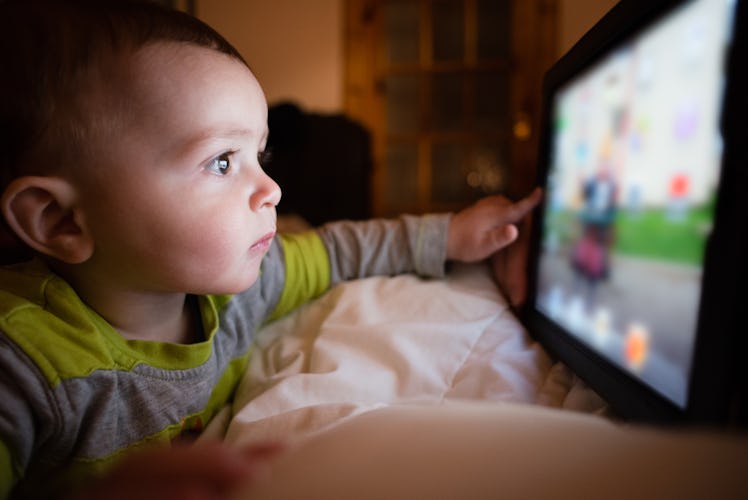One More (Huge) Reason Not To Give Your Baby Screen Time
The more screen time a 1-year-old gets, the greater their risk of this.

Screen time — especially for kids — has gotten a bad rap for a number of reasons, from raising the risk for attention and mental health problems to unhealthy weight gain. Now, researchers have discovered another reason to be wary of letting very young kids become iPad babies: A recent study shows that more screen time at age 1 is linked to a higher risk of certain developmental delays years later.
For the study, published in JAMA Pediatrics, researchers from two universities in Japan checked in with 7,097 mother-child pairs when the children were ages 1, 2 and 4. At each point, they asked about screen time habits and measured five types of developmental ability. Children were categorized as having either less than one hour of screen time per day, one to two hours, two to four hours, or four or more hours.
Researchers found that the more screen time children were exposed to at age 1, the more likely they were to have a developmental delay in communication at age 2. The odds of having a communication-related developmental delay at age 2 were a whopping 4.78 times greater for kids who got four or more hours of screen time per day at age 1 than those who got less than one hour. Children with as few as one to two hours of screen time per day also had an increased risk of a developmental delay in communication.
Two-year-olds who got more than four hours of screen time per day at age 1 were also more likely to have developmental delays in personal and social skills, problem-solving, and fine motor skills like manipulating objects with their hands. A problem-solving developmental delay also affected kids who had two to four hours of screen time per day.
Screen time at age 1 still was linked to some risk of developmental delay by the time those kids turned 4. Namely, there was still a risk of communication developmental delay for 4-year-olds who had more than two hours of screen time at age 1, and a risk of problem-solving delay for those who had four or more hours of screen time per day.
4.78x
The odds of having a communication-related developmental delay at age 2 for kids who got four or more hours of screen time per day at age 1, compared to those who got less than one hour per day.
The World Health Organization recommends no screen time for children younger than 2 years old, but this is impractical advice for many parents.
“No parent would listen to that. It just has to be in moderation. With a heavy dose of real-life social interaction,” David Lewkowicz, Ph.D., a developmental psychologist at the Yale Child Study Center, told The New York Times. “Talk to your child as much as you can, face-to-face as much as you can.”
The reason screen time at age 1 may be linked to developmental delays in early childhood is that kids this young can’t learn from screens.
“Kids learn how to talk if they’re encouraged to talk, and very often, if they’re just watching a screen, they’re not having an opportunity to practice talking,” John Hutton, M.D., a pediatrics professor at Cincinnati Children’s Hospital Medical Center, who wasn’t involved in the study, told CNN. “They may hear a lot of words, but they’re not practicing saying a lot of words or having a lot of that back-and-forth interaction.”
But do these developmental delays really matter long-term in a child’s development? Based on the study, it’s unclear whether those delays persist past age 4 — aka, whether they’re a problem that will affect your kids in school or later in life.
It’s also important to note that a lot of developmental delays get blown out of proportion. “We don’t become concerned unless a child falls outside the range when 95% of children should be doing that particular skill, whether it’s saying first words or crawling or standing,” Susan Buttross, M.D., a professor of pediatrics at the University of Mississippi, previously told Fatherly.
“We don’t panic when we see a small delay, and if a child’s delayed in one area, sometimes it just needs to be monitored,” she continued. “But if they’re delayed in several different areas, we become a little more concerned and we’ll move to a real evaluation.”